Exercise addiction which is also known as compulsive exercise or excessive exercise is a condition in which an individual becomes excessively and obsessively preoccupied with physical activity and exercise.
In today’s content, you will get to know about exercise addiction symptoms. read till the last dot so you will get the information you need to know when you are getting addicted in order to avoid it.
It goes beyond a healthy commitment to fitness and can have negative physical, psychological, and social consequences.
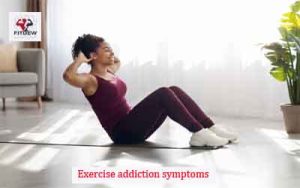
Importance of recognizing exercise addiction as a mental health issue
Here are some key points regarding the importance of recognizing exercise addiction as a mental health issue
Identification and Diagnosis
Accepting that exercise addiction as a mental health issue allows for proper identification and diagnosis of the condition.
This is critical for individuals who may not realize they have a problem or for healthcare professionals to provide appropriate treatment.
Treatment and Support
Mental health recognition ensures that individuals with exercise addiction receive the right kind of treatment and support.
They can access mental health professionals, therapists, and support groups who specialize in addiction treatment, thus improving their chances of recovery.
Reducing Stigma
By categorizing exercise addiction as a mental health issue, we help reduce the stigma surrounding it.
People are less likely to feel shame or embarrassment about their struggles, making it easier for them to seek help.
Understanding Underlying Causes
Treating exercise addiction as a mental health issue enables a deeper exploration of the underlying causes.
It might be related to anxiety, depression, or low self-esteem, and addressing these root causes is crucial for long-term recovery.
Preventing Physical and Psychological Harm
Excessive exercise can lead to serious physical and psychological harm including injuries, eating disorders, and social isolation.
Recognizing it as a mental health issue allows for early intervention and prevention of these negative consequences.
Educating the Public
When exercise addiction is considered a mental health issue, it raises awareness about the problem.
People become more informed about the signs, symptoms, and risks associated with it, making it easier to detect and address.
Promoting a Balanced Lifestyle
Realizing it is exercise addiction encourages a more balanced approach to fitness.
Instead of promoting extreme and unhealthy exercise habits, it emphasizes the importance of moderation and a holistic approach to well-being.
Protecting Vulnerable Populations
Certain groups such as athletes, individuals with a history of eating disorders, or those with perfectionist tendencies are at higher risk for exercise addiction.
Recognizing it as a mental health issue allows for targeted prevention and support measures for these populations.
Research and Evidence-Based Interventions
Treating exercise addiction as a mental health issue encourages research into effective interventions and treatments.
This can lead to evidence-based strategies for prevention and recovery.
Legal and Ethical Implications
In some cases, exercise addiction may lead to illegal activities like the abuse of performance-enhancing drugs. Recognizing it as a mental health issue can have legal and ethical implications for individuals and organizations involved in sports and fitness.
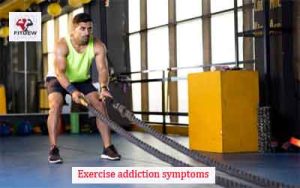
Meaning of Exercise addiction
Exercise addiction also known as compulsive exercise or excessive exercise is a behavioral disorder characterized by a compulsive and unhealthy preoccupation with physical activity and exercise.
People with exercise addiction engage in exercise to an excessive and often harmful degree and they may prioritize it above all else in their lives including their physical and mental well-being.
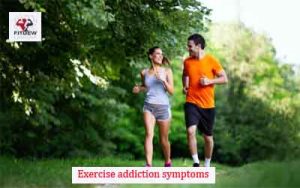
The thin line between dedication and addiction
The thin line between dedication and addiction is a complex and usually subjective concept that can vary from person to person and from one context to another.
Here are some key points to consider
Commitment to a Goal
Dedication involves a strong commitment to a particular goal, cause, or activity. It implies a sense of purpose and a willingness to invest time and effort to achieve that goal.
Addiction on the other hand often lacks a clear goal and may be driven by an insatiable need for a substance or behavior.
Balance and Moderation
Dedication typically allows for a healthy balance between one’s commitment and other aspects of life, such as relationships, health, and well-being.
Addiction tends to disrupt this balance, with the object of addiction taking precedence over other important aspects of life.
Positive vs. Negative Outcomes
Dedication usually leads to positive outcomes such as personal growth, skill development, and goal achievement.
Addiction, by contrast, often leads to negative consequences, including physical and psychological harm, strained relationships, and negative impacts on one’s life.
Self-Control
Dedication is often characterized by a sense of control over one’s actions and the ability to set boundaries.
Addiction is marked by a loss of control, as individuals may find it difficult to resist or manage their urges.
Dependency
Dedication can be a healthy and constructive form of dependency on a goal or cause.
Addiction, however, involves an unhealthy dependency on a substance or behavior, which can have detrimental effects on a person’s well-being.
Psychological and Physical Health
Dedication tends to promote good physical and psychological health by fostering positive habits and discipline.
Addiction on the other hand, can lead to physical and mental health issues, often due to the harmful nature of the addictive behavior or substance.
Social Impact
Dedication can be a source of inspiration and motivation for others, fostering a sense of community and support. Addiction can isolate individuals and strain relationships.
Recognition of Harm
Dedication often involves a realistic awareness of the potential challenges and sacrifices associated with pursuing a goal. In Addiction, there may be denial or downplaying of the harmful consequences.
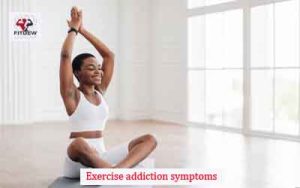
Exercise addiction symptoms
Check out some of common symptoms and signs associated with exercise addiction
Excessive Amount of Exercise
Individuals with exercise addiction often engage in exercise far beyond what is necessary for health or fitness.
They may spend an excessive amount of time working out each day and feel anxious or guilty if they miss a session.
Neglect of Responsibilities
Those with exercise addiction may prioritize exercise over other important life responsibilities, such as work, school, family, or social relationships.
Tolerance
Just like with substance addiction, people with exercise addiction may find that they need to increase the intensity or duration of their workouts to achieve the same level of satisfaction or stress relief.
Withdrawal
When unable to exercise, individuals with exercise addiction may experience symptoms of withdrawal, such as anxiety, restlessness, irritability, or depression.
Loss of Interest in Other Activities
They may lose interest in hobbies or activities that were once enjoyable in favor of exercising.
Continued Exercise Despite Injury or Illness
Exercise addicts may persist in their exercise routine even when they are injured or ill, sometimes making their condition worse.
Distorted Body Image
Some individuals with exercise addiction have a distorted or unhealthy perception of their own body, always seeking perfection in terms of muscle definition, weight, or body fat percentage.
Social Isolation
Exercise addiction can lead to social withdrawal as individuals prioritize exercise over spending time with friends and family.
Eating Disorders
Exercise addiction is sometimes co-occurring with eating disorders as individuals may use exercise to compensate for food consumption.
Feelings of Guilt or Anxiety
They may experience extreme guilt or anxiety if they miss a workout or deviate from their exercise routine.
Inability to Cut Down or Control Exercise
Despite recognizing the negative consequences, individuals with exercise addiction struggle to cut down or control their exercise.
Lack of Enjoyment
Exercise addicts may no longer find enjoyment in physical activity but continue to engage in it out of compulsion.
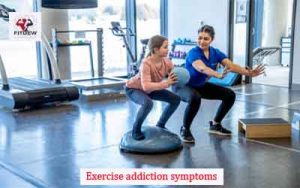
Solutions to Exercise addiction symptoms
Exercise addiction can be a serious condition that affects a person’s physical and mental health. If you or someone you know is struggling with exercise addiction, it is important to seek help from a healthcare professional or mental health expert.
Here are some general strategies that might be helpful in addressing exercise addiction symptoms
Recognize the Problem
The first step is acknowledging that there is a problem. Denial or downplaying the severity of the addiction can hinder progress.
Consult a Healthcare Professional
A doctor or mental health professional can assess the situation and provide appropriate guidance. They might recommend therapy, counseling, or other forms of treatment.
Therapy and Counseling
Cognitive-behavioral therapy (CBT) and psychotherapy can help individuals understand the root causes of their addiction and develop coping mechanisms.
Support Groups
Joining support groups or talking to others who have overcome exercise addiction can provide valuable insights and encouragement.
Set Realistic Goals
Establish healthy, realistic exercise goals and stick to them. Avoid excessive or obsessive workout routines.
Diversify Activities
Engage in a variety of activities to prevent fixation on a single type of exercise. This can include yoga, meditation, or any other hobbies that bring joy.
Rest and Recovery
Learn the importance of rest and recovery in physical fitness. Allow your body the time it needs to heal and recuperate.
Social Support
Spend time with family and friends who are supportive and understanding. Healthy social interactions can help in reducing the need for excessive exercise.
Mindfulness and Stress Management
Practice mindfulness techniques and stress-reduction activities like meditation and deep breathing to manage anxiety and stress.
Seek Professional Help
If exercise addiction is severely impacting your life, consider seeking help from addiction specialists or mental health professionals with experience in behavioral addictions.
Address Underlying Issues
Sometimes, exercise addiction can be a way of coping with deeper emotional issues. Addressing these underlying problems through therapy can be crucial in overcoming the addiction.
Monitor and Limit Exercise
If necessary, have a trusted friend or family member help you monitor and limit your exercise routine to ensure it stays within healthy boundaries.
Develop a Healthy Self-Image
Work on building a positive self-image that is not solely dependent on physical appearance or fitness level.
Practice Self-Compassion
Be kind to yourself. Understand that recovery is a process and setbacks may happen. Treat yourself with the same compassion you would offer to a friend in a similar situation.
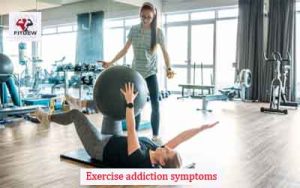
Prevention and Healthy Exercise Habits
Here are some tips and guidelines to help you prevent health issues and establish a regular exercise routine
Maintain a Balanced Diet
Eat a variety of fruits, vegetables, lean proteins, whole grains, and healthy fats. Avoid excessive consumption of processed foods, sugary drinks, and high-sugar snacks. Stay hydrated by drinking plenty of water throughout the day.
Regular Physical Activity
Aim for at least 150 minutes of moderate-intensity aerobic exercise or 75 minutes of vigorous-intensity exercise per week, as recommended by the World Health Organization (WHO). Add both cardiovascular exercises (like walking, running, cycling) and strength training (using weights or bodyweight exercises) into your routine. Find activities you enjoy to make exercise a sustainable habit.
Stretching and Flexibility
Include regular stretching exercises to improve flexibility and reduce the risk of injury. Yoga and Pilates are excellent choices for enhancing flexibility and overall body strength.
Sleep and Rest
Prioritize getting 7-9 hours of quality sleep each night to allow your body to recover and rejuvenate. Rest days in your exercise routine are crucial for muscle recovery and injury prevention.
Stress Management
Chronic stress can negatively impact your health. Practice stress-reduction techniques such as mindfulness, meditation, deep breathing, or hobbies you enjoy.
Regular Health Check-ups
Schedule routine check-ups with your healthcare provider to monitor your overall health and detect potential issues early.
Hygiene and Safety
Maintain good hygiene practices to prevent infections and illnesses. Ensure your exercise environment is safe, with proper equipment and good lighting.
Avoid Smoking and Limit Alcohol
If you smoke, seek assistance to quit. Avoid exposure to secondhand smoke. Consume alcohol in moderation, if at all, as excessive alcohol can harm your health.
Stay Hydrated
Drink enough water to stay properly hydrated, as it’s vital for numerous bodily functions.
Avoid Overtraining
Listen to your body and avoid overexertion. Overtraining can lead to injuries and burnout.
Make It a Habit
Consistency is key. Make exercise and healthy habits a part of your daily routine, and it will become a natural part of your lifestyle.
Set Realistic Goals
Set achievable fitness and health goals to maintain motivation and measure your progress.
Seek Professional Guidance
If you’re new to exercise or have specific health concerns, consult with a fitness trainer or healthcare professional for guidance.
Conclusion on Exercise Addiction Symptoms
Knowing it exercise addiction symptoms is crucial for maintaining a healthy and balanced lifestyle.
This condition while less known than other forms of addiction can have serious consequences on both physical and mental well-being.
By being aware of the signs, you can take proactive steps to address the issue and seek the necessary support.
If you or someone you know is showing signs of exercise addiction, it’s important to consult with a healthcare professional, therapist, or counselor.
They can help determine the severity of the addiction and guide you towards an appropriate treatment plan.
A love for exercise is healthy, but when it begins to dominate your life and harm your overall well-being, it’s time to take action.
Also, it is essential to strike a balance between staying active and taking rest days, allowing your body and mind to recover.
Seeking support from friends and family, as well as participating in a supportive community or group, can be beneficial for those struggling with exercise addiction.
By addressing exercise addiction symptoms early and finding a balance in your fitness routine, you can enjoy the numerous benefits of exercise without the negative consequences of addiction.
Health and well-being should always be the top priority, and exercise should enhance, not endanger, your quality of life.
If you found this information helpful, continue exploring our site for more in-depth articles on exercise, mental health, and overall well-being. Stay informed and take care of yourself.
Editor’s Picks
10 Exercises to increase running speed and stamina
7 Early Morning Exercise Benefits
15 exercises that burn the most calories
3 comments
Comments are closed.